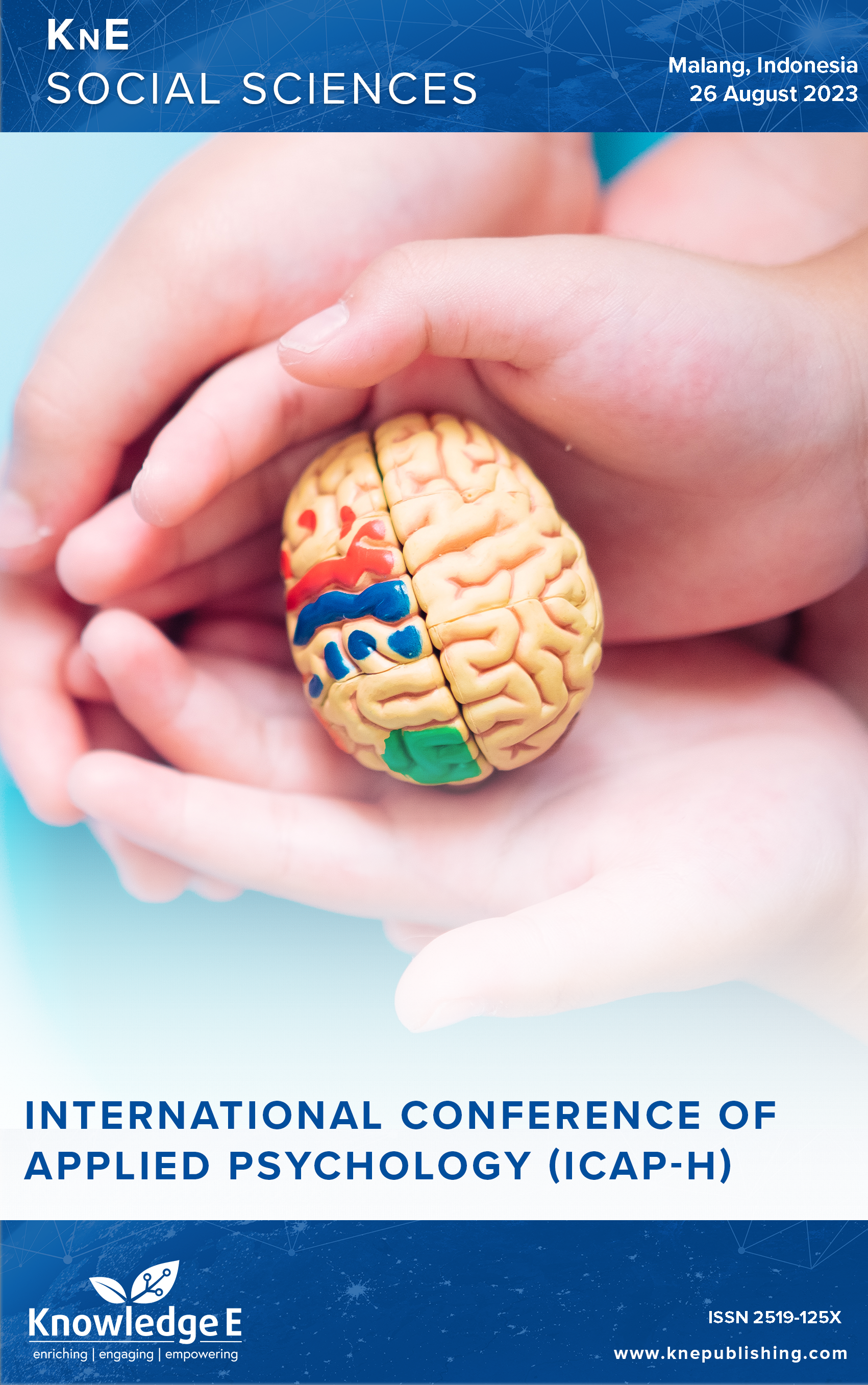Subjective Well-being Description in Women Receiving the Family Hope Programme (Program Keluarga Harapan/PKH)
DOI:
https://doi.org/10.18502/kss.v9i5.15194Abstract
Subjective well-being is a person’s perception of his life experiences, which consists of cognitive and affective evaluations of life and represents psychological well-being. The purpose of this study was to determine subjective well-being in women who received the Hope Family Programme. The research subjects were 80 women who received the Hope Family Programme in Blitar. The sampling technique used was quota sampling. Data analysis was done using quantitative descriptive analysis. The results of the analysis showed that 47.75% women who received the Hope Family Programme had a high positive effect, 52.5% had a low positive effect, 52.5% had a high negative affect, and 47.5% had a low negative effect. However, high life satisfaction was 52.5% and low life satisfaction was 47.5%.
Keywords: Family Hope Programme, subjective well-being
References
Direktorat Jenderal Anggran Kementerian Keuangan. Program Keluarga Harapan. Progr Kel Harapan 2015:17.
Diener E. Subjective well-being. Psychological Bulletin. 1984;95:542–575. https://doi.org/10.1037/0033-2909.95.3.542 DOI: https://doi.org/10.1037//0033-2909.95.3.542
Biswas-diener R, Diener E, Tamir M. The psychology of subjective well-being. American Academy of Arts and Sciences. 2004;133:18–25. DOI: https://doi.org/10.1162/001152604323049352
Pavot W, Diener E. The subjective evaluation of well-being in adulthood: Findings and implications. Ageing International. 2004;29:113–135. DOI: https://doi.org/10.1007/s12126-004-1013-4
Diener E, Chan MY. Happy people live longer: Subjective well-being contributes to health and longevity. Applied Psychology: Health and Well-Being. 2011;3:1–43. DOI: https://doi.org/10.1111/j.1758-0854.2010.01045.x
Steptoe A, Hamer M, Chida Y. The effects of acute psychological stress on circulating inflammatory factors in humans: A review and meta-analysis. Brain, Behavior, and Immunity. 2007;21:901–912. DOI: https://doi.org/10.1016/j.bbi.2007.03.011
Herbst CM. Welfare reform and the subjective well-being of single mothers. Journal of Population Economics. 2013;26:203–238. DOI: https://doi.org/10.1007/s00148-012-0406-z
Zhao S, Du H, Li Q, Wu Q, Chi P. Growth mindset of socioeconomic status boosts subjective well-being: A longitudinal study. Personality and Individual Differences. 2021;168:110301. DOI: https://doi.org/10.1016/j.paid.2020.110301
VandenBos G. A dictionary of psychology. Washington: 2007.
Compton WC. Introduction to positive psychology. In Lewis S, editor. Positive psychology at work. 2005. 1–10 p.
Diener E. The science of well-being. 2007. 11–58 p. DOI: https://doi.org/10.1007/978-90-481-2350-6_2
Mujamiasih M, Prihastuty R, Hariyadi S. Subjective well-being (SWB): Studi indigenous karyawan bersuku Jawa. J Soc Ind Psychol. 2013;2:36–42.
Ryff CD, Keyes CLM. The structure of psychological well-being revisited. Journal of Personality and Social Psychology. 1995;69:719–727. DOI: https://doi.org/10.1037//0022-3514.69.4.719
Diener E. Subjective well-being: The science of happiness and a proposal for a national index. American Psychologist. 2000;55:34–43. DOI: https://doi.org/10.1037//0003-066X.55.1.34
Azwar S. Penyusunan Skala Psikologi(Edisi 2). 2014.
Akhtar H. Evaluasi properti psikometris dan perbandingan model pengukuran konstruk subjective well-being. J Psikol. 2019;18:29. DOI: https://doi.org/10.14710/jp.18.1.29-40
Arikunto S. Prosedur penelitian (Suatu Pendekatan Praktek). Jakarta: 2006.
Sugiyono. Metode penelitian pendidikan (pendekatan kuantitatif, kualitatif dan R&D). Bandung: Penerbit Alfabeta; 2015.
Xu W, Sun H, Zhu B, Bai W, Yu X, Duan R, et al. Analysis of factors affecting the high subjective well-being of chinese residents based on the 2014 china family panel study. International Journal of Environmental Research and Public Health. 2019;16. DOI: https://doi.org/10.3390/ijerph16142566
Csikszentmihalyi, M., Abuhamdeh S, Nakamura J. Handbook of competence and motivation (pp. 598–608). Guilford Publications; 2005.
Carr A. Positive psychology: The science of happiness and human strength. New York, Brunner: Routledge. 2004. 278–279 p.
Mok KH. The search for new governance of higher education in Asia. International and development education series. European Research Studies Journal. 2010;XXI(2):586–600.
Diener E, Suh E, Oishi S. Recent findings on subjective well-being. Indian Journal of Clinical Psychology. 1997;24:25–41.

